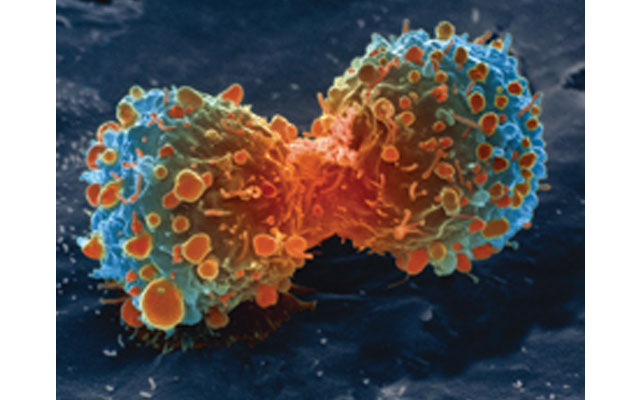
Study finds genetic difference in prostate cancer in African-Americans
The mutations, which are thought to disable a previously unrecognized tumor suppressor gene, were found in about 5 percent of prostate cancer specimens from 192 black men included in the study, whose results were published online today by Cancer Discovery. By comparison, these mutations occur in about 1 percent of prostate cancer specimens from predominantly white men of European descent analyzed by The Cancer Genome Atlas project, the authors said. Mutations in a gene called ERF also appeared to be associated with more aggressive, castration-resistant cases of prostate cancer, according to the researchers.
African-American men have a 1.4-fold higher risk of developing prostate cancer and a 2.4-fold greater mortality from the disease. The finding of a gene mutation that may occur more frequently in African-Americans “tells us that there are differences, and they are probably informative for how prostate cancer develops and how it behaves,” said Franklin Huang, MD, PhD, a medical oncologist at Dana-Farber. He is first author of the report with Juan Miguel Mosquera, MD, MSc, a pathologist at Weill Cornell Medicine in New York.
“It is at least a step in the right direction of beginning to understand the genomic basis of aggressive prostate cancer,” Huang added. “However, we wouldn’t expect a ‘smoking gun’ that would explain this large disparity in incidence and mortality between African-American and white men.” Huang explained that this is in part because relatively few mutations of any kind have been found in prostate cancer, compared to some other forms of cancer.
Although African-American men suffer disproportionately from prostate cancer, the authors said they “have been under-represented in most systematic studies of prostate cancer performed to date.”
For the current study, the researchers drew on prostate cancer samples from black men treated at the Karmanos Cancer Institute in Detroit; Weill Cornell Medicine; Johns Hopkins University School of Medicine, and Roswell Park Cancer Institute.
When they sequenced the exomes – protein-coding DNA – of the cancer samples from African-American men and matched normal controls, the investigators identified several gene mutations that disabled the ERF gene. “ERF is recurrently mutated in primary prostate cancer in African-American men,” said the researchers. They also discovered that prostate tumors with a loss of ERF copies had more aggressive features when studied by pathologists.
In addition, the scientists carried out laboratory experiments revealing that mutated or missing ERF encouraged cancerous growth, while overexpression of ERF slowed cancerous growth. “These results were consistent with a possible tumor suppressor role for ERF in prostate cancer,” the authors concluded.
Other genetic differences between white and African-American prostate cancer specimens also came to light in the study. For example, a gene known as PIK3CA is mutated in about 3 percent of prostate cancers in white patients, but was not mutated in the samples taken from black men. However, “There are still unexplained reasons for the aggressive nature of prostate cancer in African-American men that is only partially explained by the genomic studies to date,” said the investigators.
The results of the current study have a larger implication, the researchers said. Including more patients of African ancestry in cancer genomic studies – not just prostate cancer – “may enable the discovery of new cancer genes and inform the inclusion of diverse populations towards precision cancer medicine.”
Corresponding authors of the report are Levi Garraway, MD, PhD, formerly of Dana-Farber and now at Eli Lilly and Co.; Isaac J. Powell, MD, of Karmanos Cancer Institute; and Mark A. Rubin, MD, of Weill Cornell Medicine.
Image: Wikimedia Commons
Support Our Journalism
We cannot do without you.. your contribution supports unbiased journalism
IBNS is not driven by any ism- not wokeism, not racism, not skewed secularism, not hyper right-wing or left liberal ideals, nor by any hardline religious beliefs or hyper nationalism. We want to serve you good old objective news, as they are. We do not judge or preach. We let people decide for themselves. We only try to present factual and well-sourced news.







